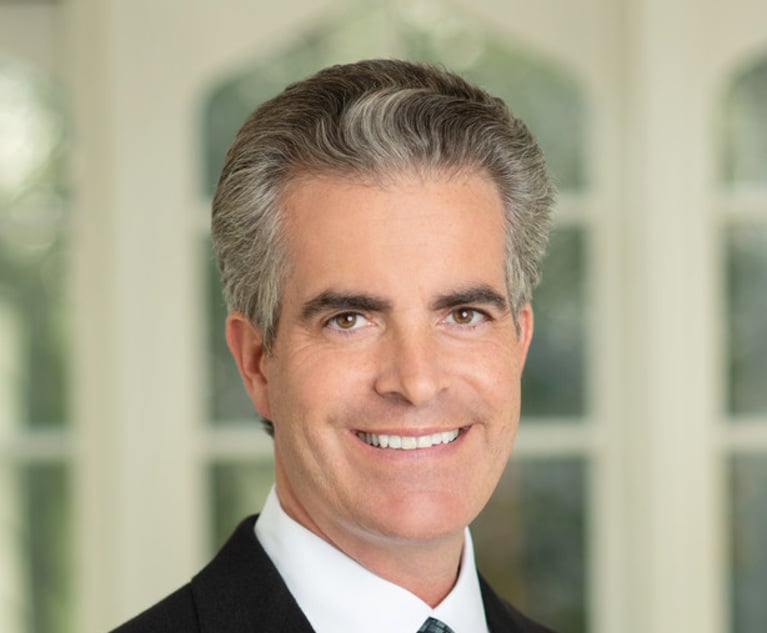 Photo: Jason Doiy
Photo: Jason DoiyJustices Won't Review Upended $32M Wrongful Death Verdict
The Pennsylvania Supreme Court has declined to hear argument in the case of a vacated $32 million verdict awarded to the family of a 6-year-old boy killed in a car accident.
February 20, 2019 at 07:35 PM
4 minute read
The Pennsylvania Supreme Court has declined to hear argument in the case of a vacated $32 million verdict awarded to the family of a 6-year-old boy killed in a car accident.
The court denied allocatur Feb. 15.
Previously, a split three-judge panel vacated the verdict April 30. Judge Judith Ference Olson authored the majority opinion and was joined by Senior Judge Eugene B. Strassburger III. Judge Victor Stabile dissented from the majority.
The accident occurred May 1, 2012, on Route 28 in Allegheny County, when the hood of a Pontiac Vibe driven by Thomas Straw malfunctioned and released upward, obstructing his view, according to court papers. Straw stopped the car, which was also carrying his wife, Jennifer Straw, and their sons, Elijah and Rowan, in the center travel lane of the highway, with open lanes on either side.
A Ford F-250 pickup truck, owned by Golon Masonry Restoration Inc. and driven by Kirk Fair in the course of his employment with the company, collided with the rear of the Straws' car, killing Elijah Straw, who was in a car seat, and injuring his parents and brother.
Memos from both sides said Fair was fumbling with folders that had fallen to the floor and had taken his eyes off the road. Fair pleaded guilty to homicide by vehicle, three counts of aggravated assault by vehicle and four counts of recklessly endangering another person, among other charges, according to the plaintiffs' memo. He was sentenced to six to 23 months' imprisonment and 10 years' probation, the memo said.
Thomas and Jennifer Straw each suffered concussions, lumbar spine fractures, bruises, lacerations and abrasions, and Rowan Straw had seizures at or on the way from the accident scene and was kept in the hospital for four days, the plaintiffs' memo said.
Thomas and Jennifer Straw each had mental-health issues tied to the accident, the memo said. Thomas Straw developed major depressive disorder.
An Allegheny County jury subsequently found in favor of the plaintiffs, but the Superior Court held on appeal that the trial court erroneously granted summary judgment in favor of additional defendants, auto stores that provided service to the Straws' vehicle prior to the accident, claiming that it was up to the jury to determine their liability.
“Even though Tower Auto, Jiffy Lube, and NAPA Auto Parts performed their services weeks or months prior to the accident, the mere lapse of time does not take the proximate cause issue away from the jury,” Olson wrote. “Viewing the evidence in the light most favorable to appellants, a jury could properly conclude that the hood latch had been damaged 'for a substantial amount of time' prior to the accident and that it merely took weeks or months for the air speed and drag to finally, and foreseeably, open the dangerously unsecured hood.”
However, Stabile opposed the complete undoing of the verdict.
“I do not believe it is necessary for this court to examine whether the conduct of the additional defendants was a proximate cause of plaintiffs' harm, since I would conclude that Fair's conduct was a superseding cause of the harm,” Stabile wrote in his dissent. “Fair's extraordinary conduct was not a reasonably foreseeable or normal result of the combined actions of the additional defendants. His conduct was extraordinary in the degree of its recklessness that could not have been foreseen by additional defendants, thus relieving them of liability for any antecedent negligence.”
But Olson, addressing that issue in the majority opinion, said it was for a jury to decide “whether Mr. Fair's criminal acts and particular combination of speeding, inattentive driving, and (alleged) intoxication were 'so extraordinary as not to be reasonably foreseeable' to the additional defendants.”
Jon Perry of Rosen Louik & Perry, who represents the Straw family, said he was able to reach a settlement with the defendants in the case, so the Supreme Court's allocatur denial has no effect on his clients.
Robert Arcovio of Margolis Edelstein, who represents Fair, did not respond to a request for comment.
This content has been archived. It is available through our partners, LexisNexis® and Bloomberg Law.
To view this content, please continue to their sites.
Not a Lexis Subscriber?
Subscribe Now
Not a Bloomberg Law Subscriber?
Subscribe Now
NOT FOR REPRINT
© 2024 ALM Global, LLC, All Rights Reserved. Request academic re-use from www.copyright.com. All other uses, submit a request to [email protected]. For more information visit Asset & Logo Licensing.
You Might Like
View All

Pittsburgh Judge Rules Loan Company's Online Arbitration Agreement Unenforceable
3 minute read
Phila. Jury Awards $15M to Woman Who Slipped on Apartment Building Stairs
4 minute read
Pa. Hospital Agrees to $16M Settlement Following High Schooler's Improper Discharge
4 minute readTrending Stories
- 1Decision of the Day: Judge Reduces $287M Jury Verdict Against Harley-Davidson in Wrongful Death Suit
- 2Kirkland to Covington: 2024's International Chart Toppers and Award Winners
- 3Decision of the Day: Judge Denies Summary Judgment Motions in Suit by Runner Injured in Brooklyn Bridge Park
- 4KISS, Profit Motive and Foreign Currency Contracts
- 512 Days of … Web Analytics
Who Got The Work
Michael G. Bongiorno, Andrew Scott Dulberg and Elizabeth E. Driscoll from Wilmer Cutler Pickering Hale and Dorr have stepped in to represent Symbotic Inc., an A.I.-enabled technology platform that focuses on increasing supply chain efficiency, and other defendants in a pending shareholder derivative lawsuit. The case, filed Oct. 2 in Massachusetts District Court by the Brown Law Firm on behalf of Stephen Austen, accuses certain officers and directors of misleading investors in regard to Symbotic's potential for margin growth by failing to disclose that the company was not equipped to timely deploy its systems or manage expenses through project delays. The case, assigned to U.S. District Judge Nathaniel M. Gorton, is 1:24-cv-12522, Austen v. Cohen et al.
Who Got The Work
Edmund Polubinski and Marie Killmond of Davis Polk & Wardwell have entered appearances for data platform software development company MongoDB and other defendants in a pending shareholder derivative lawsuit. The action, filed Oct. 7 in New York Southern District Court by the Brown Law Firm, accuses the company's directors and/or officers of falsely expressing confidence in the company’s restructuring of its sales incentive plan and downplaying the severity of decreases in its upfront commitments. The case is 1:24-cv-07594, Roy v. Ittycheria et al.
Who Got The Work
Amy O. Bruchs and Kurt F. Ellison of Michael Best & Friedrich have entered appearances for Epic Systems Corp. in a pending employment discrimination lawsuit. The suit was filed Sept. 7 in Wisconsin Western District Court by Levine Eisberner LLC and Siri & Glimstad on behalf of a project manager who claims that he was wrongfully terminated after applying for a religious exemption to the defendant's COVID-19 vaccine mandate. The case, assigned to U.S. Magistrate Judge Anita Marie Boor, is 3:24-cv-00630, Secker, Nathan v. Epic Systems Corporation.
Who Got The Work
David X. Sullivan, Thomas J. Finn and Gregory A. Hall from McCarter & English have entered appearances for Sunrun Installation Services in a pending civil rights lawsuit. The complaint was filed Sept. 4 in Connecticut District Court by attorney Robert M. Berke on behalf of former employee George Edward Steins, who was arrested and charged with employing an unregistered home improvement salesperson. The complaint alleges that had Sunrun informed the Connecticut Department of Consumer Protection that the plaintiff's employment had ended in 2017 and that he no longer held Sunrun's home improvement contractor license, he would not have been hit with charges, which were dismissed in May 2024. The case, assigned to U.S. District Judge Jeffrey A. Meyer, is 3:24-cv-01423, Steins v. Sunrun, Inc. et al.
Who Got The Work
Greenberg Traurig shareholder Joshua L. Raskin has entered an appearance for boohoo.com UK Ltd. in a pending patent infringement lawsuit. The suit, filed Sept. 3 in Texas Eastern District Court by Rozier Hardt McDonough on behalf of Alto Dynamics, asserts five patents related to an online shopping platform. The case, assigned to U.S. District Judge Rodney Gilstrap, is 2:24-cv-00719, Alto Dynamics, LLC v. boohoo.com UK Limited.
Featured Firms
Law Offices of Gary Martin Hays & Associates, P.C.
(470) 294-1674
Law Offices of Mark E. Salomone
(857) 444-6468
Smith & Hassler
(713) 739-1250





